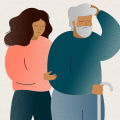Taking regular breaks allows caregivers to rest, recover and reduce stress. This, in turn, can improve overall health, reduce the risk of burnout, and enjoy a more positive care experience. Caregiving is a highly rewarding experience, but it can cause stress, exhaustion, fatigue and health problems for the caregiver. In-Home Care near Howey in the Hills FL is one way to manage the recipient's needs without being overwhelmed. While doing so, you should consider using temporary care. This service provides temporary care and supervision when you need to work or take a break. Taking regular breaks allows caregivers to rest, recover and reduce stress. This, in turn, can improve overall health, reduce the risk of burnout, and enjoy a more positive care experience. Caregiving is a highly rewarding experience, but it can cause stress, exhaustion, fatigue and health problems for the caregiver. In-Home Care near Howey in the Hills FL is one way to manage the recipient's needs without being overwhelmed. While doing so, you should consider using temporary care. This service provides temporary care and supervision when you need to work or take a break.
Caring for a family member, especially someone with important needs, is a labor of love. Whether you care for your spouse, parents, an adult child, a grandchild or another family member, work involves high demands, exhausting hours, no pay, little time for you and, in some cases, comes with risks for health. Meeting the needs of a loved one can be detrimental to the caregiver's own well-being. While this function can be highly satisfying, it can also cause exhaustion and risks of high blood pressure, fatigue or sleep problems, depression, isolation, significant weight loss or gain, and even premature death, explains Marie Clouqueur, a therapist and geriatric case manager in the Geriatrics Division at Harvard-affiliated McLean Hospital.
Temporary care services are often limited and there is little public knowledge about the programs that exist. There is also a shortage of workers to provide caregivers with a break and few financial resources to help families pay for it, says Jill Kagan, director of the ARCH National Respite Network and Resource Center, an advocacy group and research. Caring can be a difficult task, but ironically, one of the most difficult tasks could be taking a break. You may feel that a little bit of rest and rest would be “selfish,” or you may worry about how your loved one will fare in your absence, however brief. Temporary care services are often limited and there is little public knowledge about the programs that exist. There is also a shortage of workers to provide caregivers with a break and few financial resources to help families pay for it, says Jill Kagan, director of the ARCH National Respite Network and Resource Center, an advocacy group and research. Caring can be a difficult task, but ironically, one of the most difficult tasks could be taking a break. You may feel that a little bit of rest and rest would be “selfish,” or you may worry about how your loved one will fare in your absence, however brief.
Nadine spent four hours on each visit with volunteers who enthusiastically engaged with her and other dementia patients, learning about their history, talking, singing and sharing meals, while Johnson took a much needed break from her care routine. You need to take a break from time to time to exercise, go to doctor's appointments, see friends, or simply recharge your batteries to keep your balance and have the strength you need to continue as a caregiver. The Aging Agency in your local area can also provide relief support through the government's Family Caregiver Support Program. Adults are family caregivers, but the vast majority of them don't receive any type of temporary care.
The Family Caregiver Alliance (FCA) seeks to improve the quality of life of caregivers through education, services, research and promotion. Through its National Center for Caregivers, the FCA provides information on current social, public policy and caregiving issues, and provides assistance in the development of public programs and private for caregivers. Adults are family caregivers, but the vast majority of them, about 85%, don't receive any type of temporary care, according to a survey by the National Alliance for Caregiving and AARP. The program has attracted national attention for offering a break that gives patients a sense of purpose and, at the same time, allows their caregivers to rest, says Daphne Johnston, director of the Ministry of Breathing at the First United Methodist Church, in Montgomery.
The Family Caregiver Alliance of San Francisco offers rest camps, where caregivers can take a weekend off while caring for their loved one in a quiet tree-lined retreat. For residents of the San Francisco Bay Metropolitan Area, FCA provides direct support services for caregivers of people with Alzheimer's disease, stroke, traumatic brain injury, Parkinson's disease, and other debilitating diseases that affect adults. It includes financial, legal and medical information that is vital for caregivers, as well as a special section dedicated to how to care for yourself while dealing with caregiving challenges. To qualify, you must be a caregiver who helps a person over 60 years of age or an Alzheimer's patient of any age.


